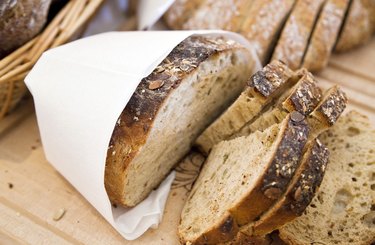
Temporomandibular joint and muscle disorders involve the chewing muscles and joints connecting the lower jaw to the skull. Although TMJ is technically the abbreviation for the joint, people commonly use this term as shorthand for the disorders and symptoms, says MedlinePlus. Diet changes can prevent episodes of TMJ and help ease symptoms.
Identification
The temporomandibular joints are located on each side of your head in front of your ears, connecting your lower jaw to your skull. A small cartilage disc separates the bones so the lower jaw slides easily. You move these joints every time you chew, swallow and talk, so they are used very frequently, explains an April 12, 2008, article in "Dental Health Magazine" published at Worldental.org.
当天的视频
Symptoms
张开或关闭口腔时,TMJ的症状可能包括下巴的不适,压痛或疼痛。您可能会发现咀嚼不舒服,或者在您的下巴移动时可能会弹出或刺耳的声音。TMJ会引起头痛,耳痛,面部疼痛和颈部,肩膀和背部疼痛。根据Medlineplus的说法,症状可能是由于对关节周围结构,姿势不良,颈部和面部肌肉劳累,睡眠不足,生命压力和饮食不佳的身体压力而引起或恶化的。
食物要避免
您可能需要尝试消除饮食中的不同食物,以查看这是否减少了TMJ的问题。根据《牙科健康杂志》的文章,含有水杨酸盐的食物可能是一个问题。水杨酸盐发生在许多蔬菜中,并且这种物质中有许多水果很高。果酱,果冻和果汁的水杨酸含量往往很高,辣椒,橄榄,萝卜,西红柿,耐鼻子,菊苣,菊苣和栗子也很高。其他可能加重TMJ的食物包括小麦和乳制品,含有高水平的维生素C或铁的食物以及含有糖,酵母或防腐剂的产品。
食物包括
根据“牙科健康杂志”的说法,饮食中包括某些食物可能会防止TMJ症状。时不时地吃风琴肉,在饮食中包括更多的红肉和更多的脂肪,尤其是适量的饱和脂肪。此外,从动物骨骼和肌腱中煮沸以提取透明质酸以进行关节健康,并为镁含量添加大量果岭。
Diet as Treatment
To lessen pain and other symptoms during an occurrence of TMJ, avoid eating hard foods, crunchy foods, thick or large foods that involve opening your mouth wide and foods that require a lot of chewing. This gives your jaw and temporomandibular joints the opportunity to rest and heal, says Colgate. Some good foods include cooked vegetables and fruits, cottage cheese, mashed potatoes, scrambled eggs, smoothies, soup and yogurt. If you must eat food that requires chewing, cut it into small pieces.
Related Reading
TMJ是用于描述颞下颌关节疾病的缩写。颞下颌关节是您的下颌关节;他们将您的下巴连接到您的头部。患有TMJ的人在咀嚼和打哈欠时经常大声弹出或发出嘶哑的声音。疼痛可以集中在下颌区域,但也可以伸出头部,导致某些人的头痛和耳痛。TMJ是一种慢性病,可能需要进行医学和自我保健措施的结合。您可以调整饮食,以避免某些加剧病情的食物。
Crunchy
Crunchy foods, including popcorn, chips and other salty snack foods, and hard rolls may be too difficult for your jaw to chew when you have TMJ. Hard vegetables like carrots and crisp celery can also cause pain in the jaw due to the intensity with which you need to bite down on them. Eating softer foods or cooking vegetables to a softer texture can ease the muscle tension in your jaw and give the temporomandibular joints the rest they need to recover. The flavonoid content in fruits and vegetables can act as a natural anti-inflammatory agent, reports the University of Maryland Medical Center, so it is important to keep these foods in your diet.
Chewy
Your jaw works overtime when you consume chewy foods such as taffy, caramel, chewing gum, tougher cuts of meat and delicacies like lobster and escargot. The constant motion of your jaw can aggravate your joint pain when chewy foods are a staple of your diet. Instead of items that make your jaw work hard, opt for softer foods like bananas, yogurt, mashed potatoes, tender meats, poultry and fish.
Fatty
The University of Maryland Medical Center suggests that cutting back on the amount of fat in your diet may ease TMJ symptoms. Saturated fat, often found in fried foods, cream sauces, pastries and red meat, may lead to increased inflammation in the body. Drink low-fat or skim milk, choose lean proteins such as chicken, pork and fish and choose low-fat cheese and yogurts to reduce the fat content in your meals.
Large Pieces
Some people with TMJ cannot open the jaw more than a couple of inches when pain is at its worst. Even if this is not your particular problem with TMJ pain, biting into whole pieces of fruit, thick sandwiches or other foods that are large in size can overtax your jaw. The annoying and painful popping and grinding noises associated with TMJ can occur not only while you eat or yawn, but also when you open your mouth wide. The solution to this problem is simply cutting your food into smaller pieces.
Considerations
Vitamin and mineral supplements may help relieve some of the pain of TMJ. The April 2008 issue of "Dental Health" magazine suggests eating leafy greens that contain magnesium. Taking a magnesium supplement may also relax your tense and tired jaw muscles. UMMC reports that vitamin C supplements may also contribute to good joint health and may alleviate some of your symptoms.
Is this an emergency?如果您遇到严重的医疗症状,请参阅National Library of Medicine’s listof signs you need emergency medical attention or call 911.